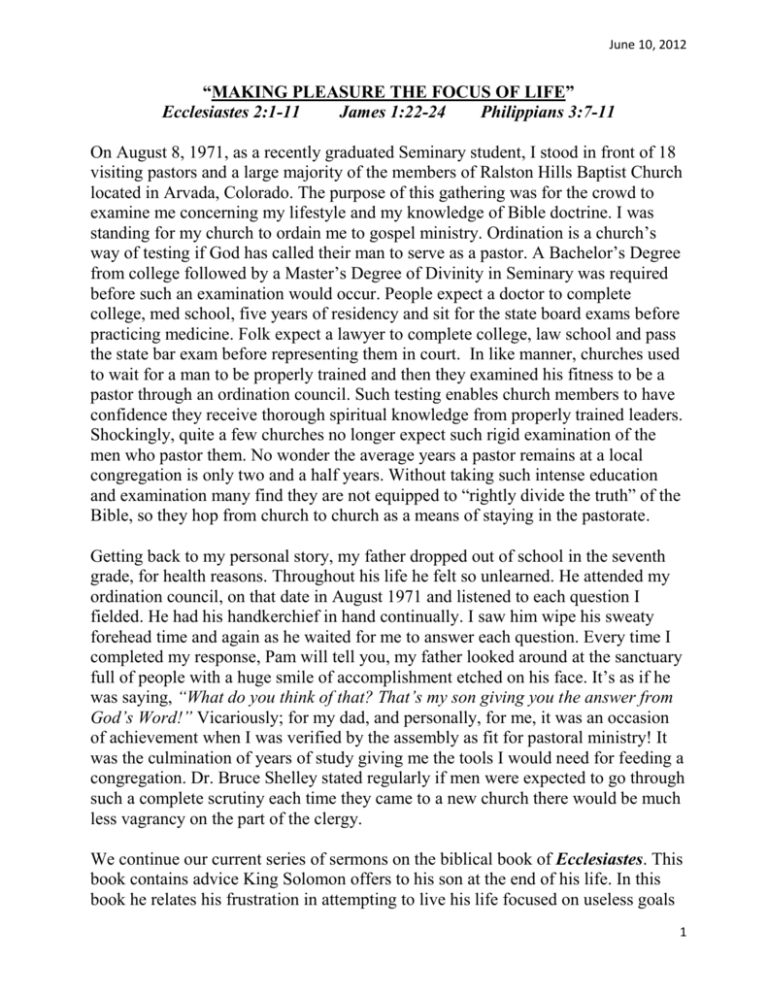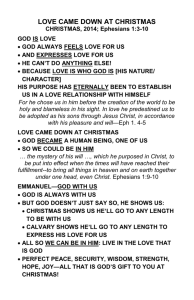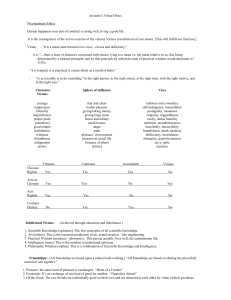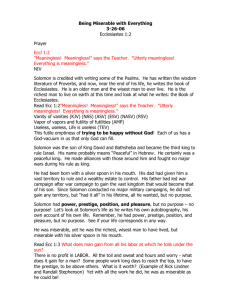Making Pleasure the Focus of Life - First Baptist Church of Cottonwood
advertisement

June 10, 2012 “MAKING PLEASURE THE FOCUS OF LIFE” Ecclesiastes 2:1-11 James 1:22-24 Philippians 3:7-11 On August 8, 1971, as a recently graduated Seminary student, I stood in front of 18 visiting pastors and a large majority of the members of Ralston Hills Baptist Church located in Arvada, Colorado. The purpose of this gathering was for the crowd to examine me concerning my lifestyle and my knowledge of Bible doctrine. I was standing for my church to ordain me to gospel ministry. Ordination is a church’s way of testing if God has called their man to serve as a pastor. A Bachelor’s Degree from college followed by a Master’s Degree of Divinity in Seminary was required before such an examination would occur. People expect a doctor to complete college, med school, five years of residency and sit for the state board exams before practicing medicine. Folk expect a lawyer to complete college, law school and pass the state bar exam before representing them in court. In like manner, churches used to wait for a man to be properly trained and then they examined his fitness to be a pastor through an ordination council. Such testing enables church members to have confidence they receive thorough spiritual knowledge from properly trained leaders. Shockingly, quite a few churches no longer expect such rigid examination of the men who pastor them. No wonder the average years a pastor remains at a local congregation is only two and a half years. Without taking such intense education and examination many find they are not equipped to “rightly divide the truth” of the Bible, so they hop from church to church as a means of staying in the pastorate. Getting back to my personal story, my father dropped out of school in the seventh grade, for health reasons. Throughout his life he felt so unlearned. He attended my ordination council, on that date in August 1971 and listened to each question I fielded. He had his handkerchief in hand continually. I saw him wipe his sweaty forehead time and again as he waited for me to answer each question. Every time I completed my response, Pam will tell you, my father looked around at the sanctuary full of people with a huge smile of accomplishment etched on his face. It’s as if he was saying, “What do you think of that? That’s my son giving you the answer from God’s Word!” Vicariously; for my dad, and personally, for me, it was an occasion of achievement when I was verified by the assembly as fit for pastoral ministry! It was the culmination of years of study giving me the tools I would need for feeding a congregation. Dr. Bruce Shelley stated regularly if men were expected to go through such a complete scrutiny each time they came to a new church there would be much less vagrancy on the part of the clergy. We continue our current series of sermons on the biblical book of Ecclesiastes. This book contains advice King Solomon offers to his son at the end of his life. In this book he relates his frustration in attempting to live his life focused on useless goals 1 June 10, 2012 which ended in futility. Two weeks ago we explored the waste of time he found in living to be the most educated person. Now we come to a second aim in life which also falls woefully short of fulfillment: the attempt to live for pleasure and happiness. Follow along as I read the first nine verses of Ecclesiastes 2: I thought in my heart, “Come now, I will test you with pleasure to find out what is good.” But that also proved to be meaningless. 2 “Laughter,” I said, “is foolish. And what does pleasure accomplish?” 3 I tried cheering myself with wine, and embracing folly—my mind still guiding me with wisdom. I wanted to see what was worthwhile for men to do under heaven during the few days of their lives. 4 I undertook great projects: I built houses for myself and planted vineyards. 5 I made gardens and parks and planted all kinds of fruit trees in them. 6 I made reservoirs to water groves of flourishing trees. 7 I bought male and female slaves and had other slaves who were born in my house. I also owned more herds and flocks than anyone in Jerusalem before me. 8 I amassed silver and gold for myself, and the treasure of kings and provinces. I acquired men and women singers, and a harem as well—the delights of the heart of man. 9 I became greater by far than anyone in Jerusalem before me. In all this my wisdom stayed with me. I hope you noticed Solomon including a vast spectrum of activities which fit under the category of gaining pleasure. He begins his advice with “laughter” which we know entails everything from the telling and listening to jokes to hosting parties designed for merry-making. He also mentions drinking alcoholic beverages, since a great number of people gain enjoyment from such activity. He tells his son “I tried cheering myself with wine”. He informs his son he gave himself to undertaking “great projects”. Jerusalem was filled with “gardens and parks”. Solomon built several “houses” for he and his family. There were “vineyards” planted and “reservoirs” of water. The king had a large contingent of “slaves”. He had the greatest amount of “herds and flocks” of anyone in Jerusalem. He amassed a tremendous amount of “silver and gold”. This renowned King of Israel collected by war and negotiation “the treasure of kings and provinces”. He recruited an array of musicians. We know assuredly Solomon had whole cities given over to the stabling of his horses. The archeological site of Megiddo has a section of stone stables which have been estimated at housing from three hundred to five hundred horses. He even had a seaport, named Ezion-geber on the eastern arm of the Red Sea. There Israel constructed smelting furnaces for the purpose of producing copper. The site lay in the path of a prevailing north wind which offered a forced draft in the furnaces. A part of Solomon’s commercial activity included a “navy of Tarshish” which brought gold, silver, ivory and apes from faraway places. (1 Kings 10:22) The list of achievements attained by Solomon to give him pride also included his having “700 2 June 10, 2012 wives of royal birth and 300 concubines”. (1 Kings 11:3) This king didn’t just have 700 wives: they were born of royal families of neighboring nations. Suffice it to say this man pursued a rigorous passion for all kinds of things to give him pleasure in his lifetime. He wasn’t at a loss for things to do! Having the opportunity to experience so many more things than any of us in this room could ever imagine in one lifetime, Solomon comes to the conclusion his focus of living for pleasure had this result, as we find in Ecclesiastes 2:10-11: 10 I denied myself nothing my eyes desired; I refused my heart no pleasure. My heart took delight in all my work, and this was the reward for all my labor. 11 Yet when I surveyed all that my hands had done and what I had toiled to achieve, everything was meaningless, a chasing after the wind; nothing was gained under the sun. Tucked away in the midst of his accounting of living for pleasure is an amazing phrase in verse 3. There we read; “I tried…embracing folly--My mind still guiding me with wisdom.” What a crazy verse of scripture! This man tried to stay faithful to God by mentally (using his mind) being committed to the “way of wisdom” while following the “way of folly” in his actions. Guess what, Folks? Life doesn’t work that way! The Apostle James tells us in his epistle: “Do not merely listen to the word, and so deceive yourselves. Do what it says. Anyone who listens to the word but does not do what it says is like a man who looks at his face in a mirror and, after looking at himself, goes away and immediately forgets what he looks like.” (James 1:22-24) The King of Israel deceived himself into thinking he could hold on to the knowledge of the way of wisdom while, at the same time, living for pleasure and fulfillment. What a tragic waste of time! We will find this author, in this incredible letter to his son, repeating the same fallacy over and over again. He was suckered into living for education (which we already discovered), for pleasure (today’s focus), for work (next Sunday), then for advancement, then for ministry (even), followed by living for wealth and lastly to be in control of everyone and everything. Let’s not be quick to cast stones at him, however! Many times we Christians hold dearly to the truth we find in scripture. Yet, when it’s time to make God the focus of all the dimensions of our lives we choose to live as Solomon did. When we succumb to such activity our allegiance is in the wrong place and we have been led astray. As Solomon states, we are “chasing after the wind”. Do you know why such a way of life is called “the way of 3 June 10, 2012 folly”? Because when we come to grips with the truth of living to gain momentary pleasure, it turns out to be a complete FOOLISH waste of time. Aren’t we tired of being foolish? In Mark 8:34-37 we see Jesus teaching His disciples and many others, saying: “...If anyone would come after me, he must deny himself and take up his cross and follow me. For whoever wants to save his life (make it worthwhile) will lose it, but whoever loses his life for me and for the gospel (lets go of what he desires to live for) will save it. What good is it for a man to gain the whole world, yet forfeit his soul? Or what can a man give in exchange for his soul? The Apostle Paul adds his take in Philippians 1:20-21 when he tells us: “I eagerly expect and hope that I will in no way be ashamed, but will have sufficient courage so that NOW AS ALWAYS Christ will be exalted in my body, whether by life or by death. FOR TO ME, TO LIVE IS CHRIST and to die is gain.” Do these New Testament verses echo what Solomon had to learn the hard way? I ask those of us here today: what is the main focus of our life? Are we just surviving? Are we living for what gives us happiness and pleasure? Is the crux of our existence tied into what we achieve? Is our bank account our primary concern in life? We get the picture don’t we? Let me finish this Biblical challenge by quoting one more scripture; found in Philippians 3:7-11. “7 But whatever was to my profit I now consider loss for the sake of Christ. 8 What is more, I consider EVERYTHING a loss compared to the surpassing greatness of knowing Christ Jesus my Lord, for whose sake I HAVE LOST ALL THINGS. I consider them rubbish, THAT I MAY GAIN CHRIST 9 AND BE FOUND IN HIM, not having a righteousness of my own that comes from the law, but that which is through faith in Christ—the righteousness that comes from God and is by faith. 10 I WANT TO KNOW CHRIST AND THE POWER OF HIS RESURRECTION AND THE FELLOWSHIP OF SHARING IN HIS SUFFERINGS, BECOMING LIKE HIM IN HIS DEATH, 11 AND SO, SOMEHOW, TO ATTAIN TO THE RESURRECTION FROM THE DEAD.” Jesus died for us; you and me! “Becoming like him in his death” demands we fashion our life around him and not around WHAT WE WANT! Thank you Solomon for sharing what you learned with us (your readers) so we can live life correctly! It takes courage to live life FOR CHRIST and not for ourselves! By learning from this spokesperson of God, we discover living for Christ requires personal submission, individual humility, complete emptiness and unconditional surrender so that He is our boss and we are His servants. It is the only way life will work! 4







